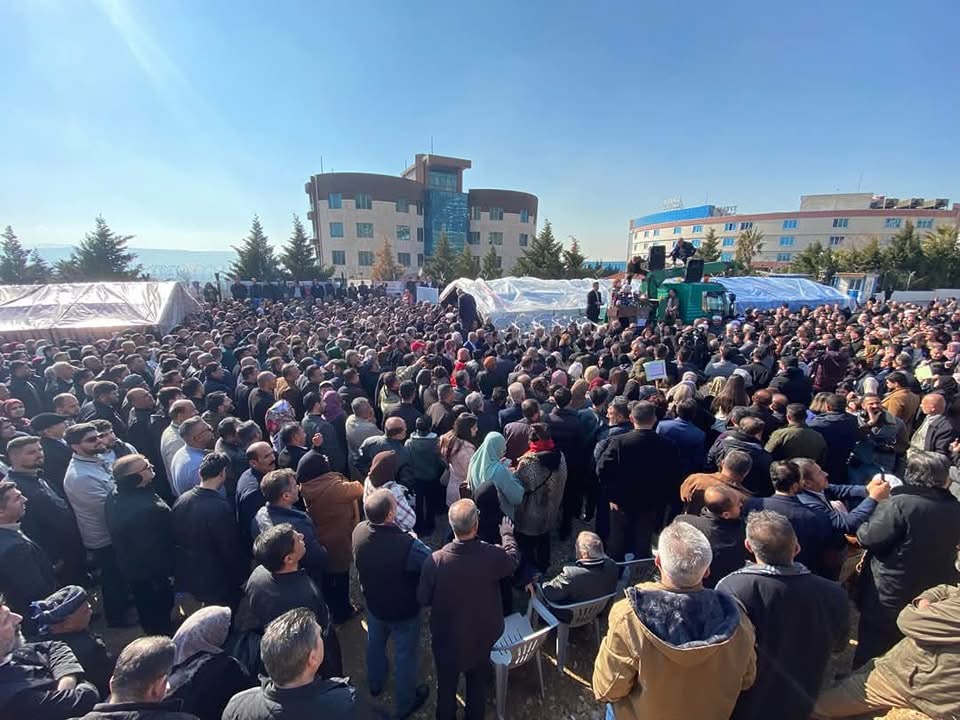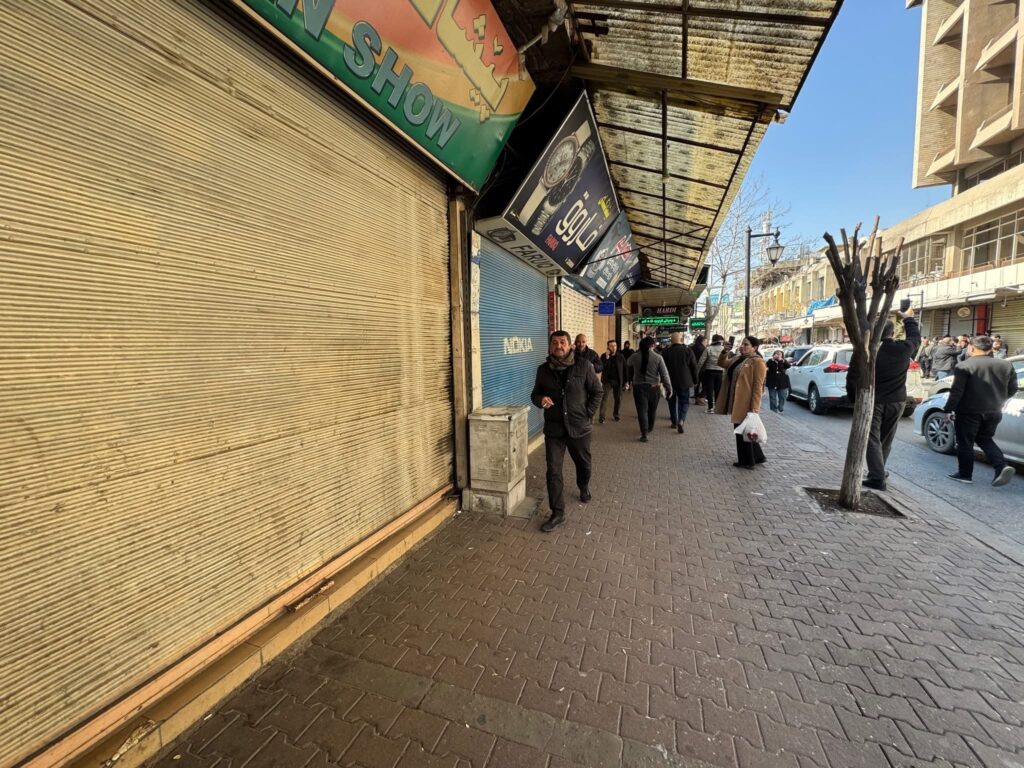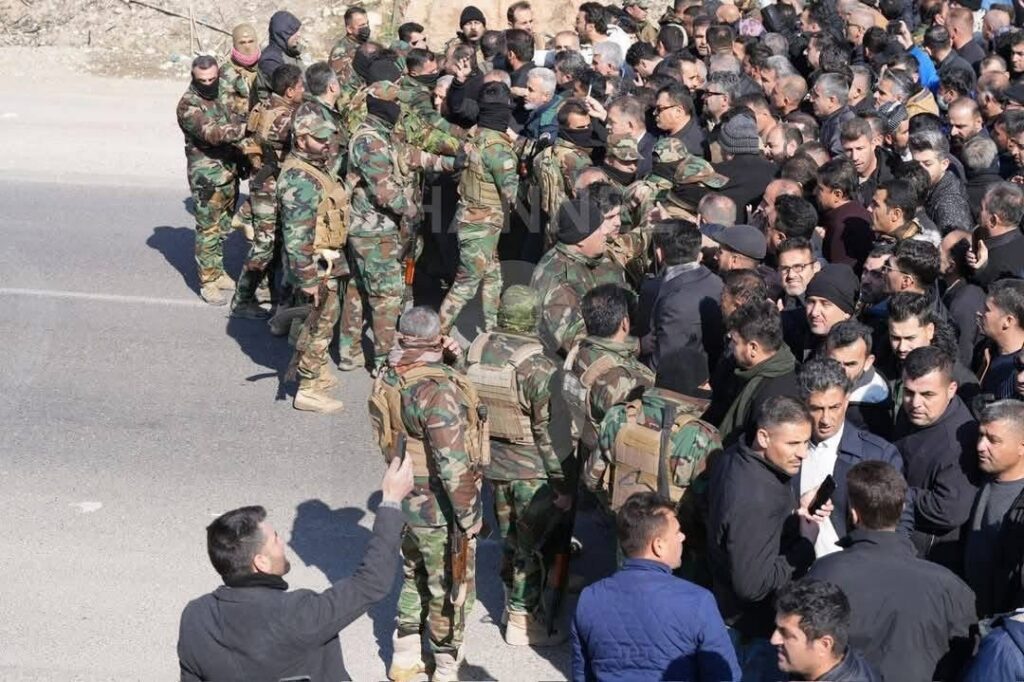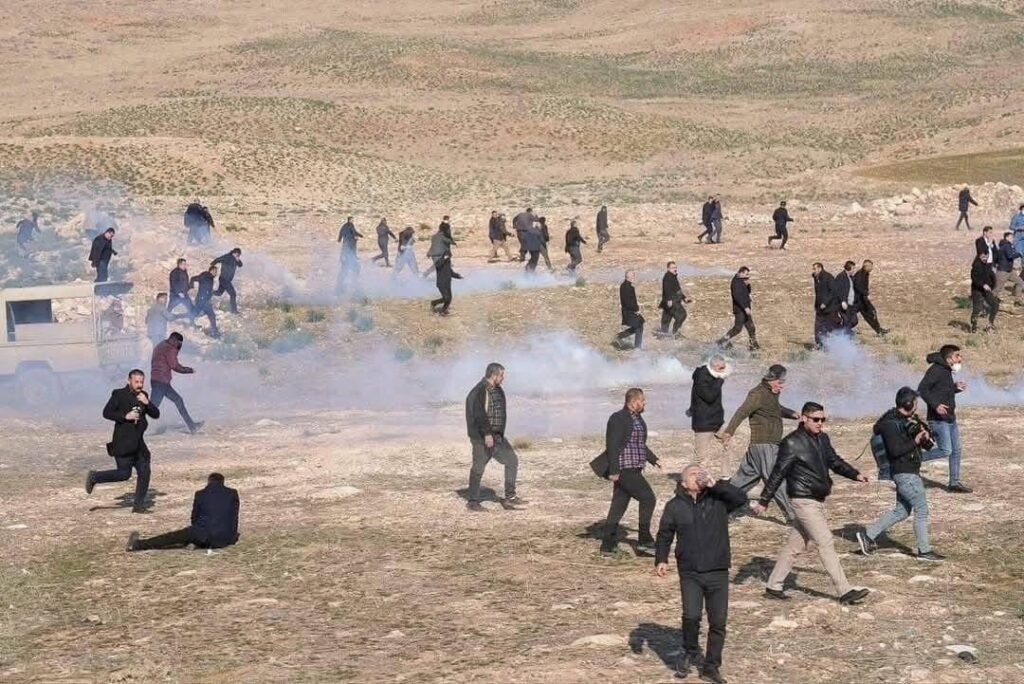Following a 15-day hunger strike, teachers and employees in the Kurdistan region have temporarily halted their protest after appeals from thousands of supporters. The strike, which garnered widespread solidarity, led to the closure of hundreds of shops and markets in Sulaimaniya and Halabja as a show of support. Despite the suspension, the protesters’ demands for salary payments and labor rights remain unaddressed, as the Kurdistan Regional Government (KRG) has yet to issue an official response.

The Hunger Strike and Its Temporary Halt
For 15 days, 13 teachers and employees in the Kurdistan region staged a hunger strike, camping in tents and refusing food to protest delayed salary payments and unresolved labor issues. Their protest became a powerful symbol of resistance, drawing attention to the struggles faced by public sector workers. The decision to suspend the strike came after thousands of supporters urged them to end their fast, citing concerns for their health. Simultaneously, hundreds of shops and markets in Sulaimaniya and Halabja shut down in solidarity, amplifying the movement’s impact.
However, the suspension of the strike does not signify the resolution of their grievances. The protesters have made it clear that their demands remain unmet, and they are prepared to escalate their actions if necessary. The decision to pause the hunger strike is seen as a strategic move, allowing the protesters to regroup while maintaining pressure on the authorities.

Government Acknowledgment and Lack of Action
Haval Abubakir, the governor of Sulaimaniya, issued a statement praising the protesters, describing them as “noble and responsible citizens” who embody the spirit of sacrifice and perseverance. He acknowledged their struggle for human, ethical, and national rights, pledging support for their cause. However, his words have not translated into tangible action, as the Kurdistan Regional Government (KRG) has remained silent on the protesters’ demands.
The absence of an official response has deepened frustration among the striking teachers and employees. Despite repeated appeals to international and national stakeholders, including the United Nations and the U.S. consulate, no significant intervention has taken place. The protesters feel abandoned by both local and global institutions, further intensifying their sense of injustice.

Checkpoint Blockade and Protesters’ Determination
The protest movement encountered a significant obstacle on February 9, when hundreds of teachers and employees were prevented from entering Erbil at the Degala checkpoint, located between Sulaymaniyah and Erbil. The group had planned to hold a peaceful demonstration in the city to present their demands to the authorities. However, security forces blocked their entry, citing unspecified reasons.
The protesters expressed their determination to reach Erbil, stating, “We consider Erbil our city and will make every effort to deliver our message to the authorities.” The blockade at the checkpoint has become a focal point of their struggle, symbolizing the broader suppression of their right to peaceful protest. This incident has further strained relations between public sector workers and the KRG, underscoring the urgent need for dialogue.

Arrest of Adam Osman Heightens Tensions
Tensions escalated further following the protests at the Degalla checkpoint on February 9, when Erbil police arrested Adam Osman, a friend of Ali Hamasalih, the leader of the National Stance Movement. Hamasalih revealed that Osman, who had accompanied him during the protests, was summoned by Erbil Asayish (Security) and subsequently detained. His whereabouts remain unknown, and his phones have been turned off, raising concerns about his safety.
Hamasalih stated, “My friend, Adam Osman, who was with me yesterday alongside teachers and employees in Degalla, was summoned this evening by Erbil Asayish. His safety is now in the hands of the security forces.” He clarified that while Osman had previously worked as his bodyguard, he currently holds no official position and only occasionally assists him as a friend. The arrest has drawn sharp criticism from Hamasalih, who accused the authorities of targeting individuals associated with the protest movement.
In a statement, Erbil police defended the arrest, citing efforts to maintain regional security. They claimed that external parties had attempted to destabilize the Kurdistan Region, prompting coordinated measures with Erbil Asayish. The police identified individuals involved in these alleged activities and confirmed the arrest of one person, promising further details soon. A video released by Erbil police showed Osman admitting his presence with Hamasalih during the Degalla protests. However, Hamasalih countered by stating that he had personally recorded and shared the protest footage on his social media accounts, emphasizing that Osman’s arrest was unjustified.
The incident has intensified the ongoing conflict between protesters and authorities, with many viewing Osman’s detention as an attempt to intimidate dissenters. Hamasalih’s public condemnation of the arrest has drawn attention to the broader issue of freedom of expression and the right to peaceful protest in the Kurdistan Region. As the situation unfolds, the arrest of Adam Osman has become a focal point in the struggle for accountability and transparency in the region.
Broader Context and Calls for Action
The teachers’ and employees’ strike is part of a larger wave of unrest in the Kurdistan region, driven by delayed salary payments and unresolved labor issues. These problems have persisted for years, causing widespread dissatisfaction among public sector workers. The recent protests have brought these issues to the forefront, with calls for urgent action to address the protesters’ grievances.
Ali Bapir, leader of the Kurdistan Justice Group, criticized the KDP’s handling of the situation, stating that the government should have welcomed the protesters instead of blocking their path. He emphasized that peaceful demonstrations are a legitimate right and urged the authorities to engage in meaningful dialogue with the protesters. Bapir’s statement reflects growing frustration with the Kurdistan Democratic Party’s approach, as many believe that the government’s inaction is exacerbating the crisis.
A Struggle Far From Over
While the suspension of the hunger strike marks a temporary reprieve, the underlying issues remain unresolved. The teachers and employees of the Kurdistan region have demonstrated remarkable resilience, but their fight for fair treatment and labor rights is far from over. The lack of an official response from the KRG and the international community’s silence have left the protesters in a precarious position.
As the region grapples with these challenges, the need for dialogue and action has never been more urgent. The protesters’ determination and the widespread support they have garnered underscore the importance of addressing their grievances. Without meaningful intervention, the tensions between public sector workers and the KRG are likely to escalate, posing a significant threat to the region’s stability. The struggle continues, and the world watches as the people of Kurdistan fight for their rights and dignity.


